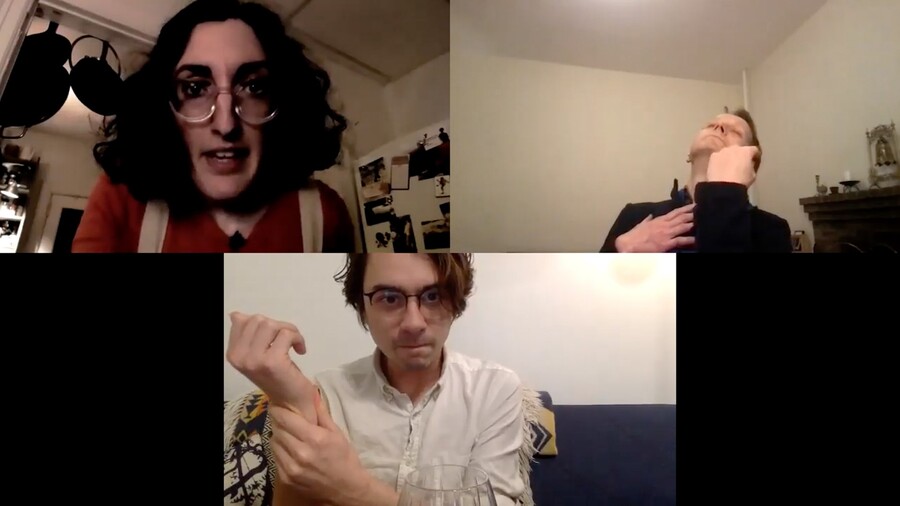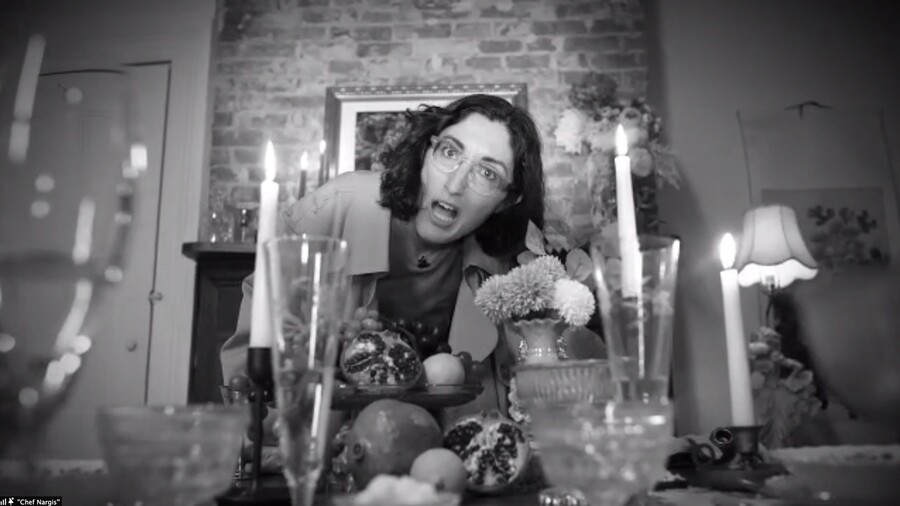A live Q&A about the creation of Disclaimer will be offered on HowlRound on Monday, March 29, 6-7 p.m. ET, at this link.
On January 8, Disclaimer was going off the rails, and I was about to be enlisted to save it.
Created by the theatre ensemble Piehole, Disclaimer (now viewable on YouTube through April 15) begins as a Persian cooking class on Zoom. Writer Tara Ahmadinejad (she/her) also stars as Nargis Saleem, an Iranian American woman flailing in her attempts to teach her class how to cook Sabzi Polo, a dish traditionally served for the Persian New Year.
It quickly becomes clear that Chef Nargis has an ulterior motive for this gathering. “The entirety of my adult life, I’ve been worried that certain powers in this country want the U.S. to go to war with Iran,” Nargis tells the class. “And I want to stop those efforts.”
How will a cooking class avert a war? By devolving into a satirical, participatory, Agatha Christie-style murder mystery, of course.
After a few more half-hearted stabs at culinary instruction, Nargis sets aside the food to tell us about her family in Iran, hoping we will relate deeply enough to these relatives to join the anti-war cause. Nargis is aided in her storytelling by ostensibly non-Middle Eastern audience members, whom she casts as silent stand-ins for her faraway relatives. But when one of these audience-family members dies in dramatic fashion, Nargis goes into full-on detective mode to find the killer.
Alas, at this performance—part of the Public Theater’s 2021 Under the Radar Festival—an audience member wasn’t cooperating. Nargis attempted to draft a man into the show as her uncle, Dr. Sohrabi—only he couldn’t seem to hear her, and we were left staring at a non-responsive face, spotlighted for all to see.
“I don’t think that’s Dr. Sohrabi,” Ahmadinejad said, wheels visibly turning in her head. “Are you sure that’s him?” Hold an awkward beat for recasting. Frozen Man’s face disappeared and then, suddenly, my own face replaced it on the screen. .
“Dr. Sohrabi!” she exclaimed. I waved back and joined the show.
Ten minutes later, I was dead—the victim of a poisoned soft drink.
For more than a decade before my star turn, Ahmadinejad unwittingly laid the roots for Disclaimer when she hosted a murder mystery party to celebrate the Persian New Year. Ahmadinejad cooked Persian food, drew up a plot, and cast her group of largely non-Iranian friends as exaggerated versions of Iranians and Iranian Americans she knew.
Several of these parts called for participants to engage in culturally appropriative actions, like wearing a headscarf or doing an Iranian accent. With Ahmadinejad’s encouragement and the help of a few drinks, her wary friends settled into their assigned roles, and a fun time was had—that is, until Ahmadinejad’s Muslim Bangladeshi landlord interrupted the proceedings and stumbled on one of her white friends in a headscarf.
“It was very uncomfortable and also very fun,” she recalled. “Afterwards, I was like, ‘Why did I make everybody do that?’ These real people morphed into stereotypes that reinforced my worst nightmare narrative around Iranian people, and I was responsible for it. That seemed like it had a lot of theatrical potential.”
The idea stayed on the back burner until the election of President Trump and his administration’s ban on travel to the United States from seven predominantly Muslim countries, including Iran. “It was a resurfacing of the most intense fears around whether I’d be seeing my family in Iran again,” said Ahmadinejad. At a difficult time, she felt pressured to “represent my people” but, at the same time, resented the need to create positive Iranian representation. Disclaimer was born out of those conflicting impulses.
Her solution? Put the audience under the microscope instead. Disclaimer’s most challenging invitations—try an accent, wear a headscarf, show the eyes of a Muslim filled with anger—are a bait-and-switch. Ahmadinejad comes to life in these bantering moments with audience members, perversely delighting in dangling the carrot of permission from a real-life Iranian American to act out stereotypes. At the last possible moment, Nargis stops these audience members from going through with their tasks, saving them from potential humiliation.
Disclaimer‘s trope-like characters poke fun at the very idea of respectable cultural representation. Minoo is suspiciously saintly; Niloofar is suspiciously sinister. And then there’s Mitchell, the suspiciously P.C. cisgender white man who has crashed this family gathering. No one, in short, is exactly who they seem to be.

Ahmadinejad co-directed Disclaimer with her husband, Jeff Wood (he/him). The couple founded Piehole in 2008 with a group of friends and fellow Brown University alumni. Now, 14 projects in, there are four core members of Piehole: Ahmadinejad, Wood, Alexandra Panzer (she/her), Disclaimer’s production designer, and Ben Vigus (he/him), its sound designer.
Disclaimer’s first reading came at the 2019 Emruz Festival, amid a busy run of solo success for Ahmadinejad, who was directing two successive New York premieres: Sarah Einspanier’s Lunch Bunch with Clubbed Thumb and Chana Porter’s Leap and the Net Will Appear with New Georges. She would return home from hours of rehearsal, then work with Wood into the night on the script.
Then the Public Theater came calling, inviting Piehole into the Devised Theater Working Group (DTWG), a developmental group for artists to create new work for the Under the Radar Festival’s Incoming! series. At that point, Piehole decided to adopt Ahmadinejad’s script as the collective’s next project.
Though the company typically devises their work or adapts works in the public domain rather than working from a living playwright’s script, Disclaimer remains very much a Piehole piece. Its use of multimedia is typical of Piehole’s work, as is its madcap humor and the direct agency it gives its audience.
Disclaimer also has members of the company stretching outside of their comfort zones. “We all do so many different things,” said Panzer. “Part of where the texture of our work comes from is doing things that you’re not necessarily the best at, and everyone having a hand in that stuff anyway.” Panzer usually performs in Piehole pieces, but here took on production design. Similarly, Wood does not typically direct for the group, Ahmadinejad does not typically perform, and this is the first fully produced show that Vigus has sound-designed for Piehole.
After months of development, Piehole presented a work-in-progress version of the piece at the Public Theater in January 2020. Before the full scope of the pandemic was clear, discussions were underway to bring Disclaimer back to the Public for the 2021 Under the Radar Festival. When the 2021 Festival went all virtual, Piehole agreed to create a digital version of their show instead.
The pivot to digital required a substantial rewrite of Disclaimer to suit it to Zoom, as well as a whole new series of technical considerations. Instead of a minimalist set that had to be quickly assembled and disassembled for a festival, the team rented an Airbnb in Greenpoint for a month and decked it out with props. Live video editing, sound mixing, lighting design, and camera operation entered the picture as well.
It wasn’t always obvious to Piehole that the piece could work digitally. Central to the in-person experience is Nargis bringing her audience family together onstage, only to watch them die, one by one, then return to their seats. According to Vigus, “When they’re in a real space together, I feel like the point lands a little more solidly because it helps you feel the impossibility of her family gathering, contrasted with how easy it was for all of us together in a room together.”
But in 2021, almost every person watching Disclaimer on Zoom has firsthand knowledge of familial separation. Zoom encodes that experience into the show’s DNA, dividing the audience from one another through screens. The video design steals freely from movies to conjure a film noir world, complete with pipes, trenchcoats, and black-and-white lighting. “The Zoom one let us lean into the film noir-mystery look in a much more intense way,” Vigus said.
To Wood, the show’s risks are key to its success online. “That’s such a vital, essential, deep part of what makes things feel alive,” he said. “We’re here together, something can go wrong, and we’ll all have to feel our way through it.”
With risks come occasional mishaps. At my show, the ending also went awry. In the final moment of audience participation, Nargis broke her rule about audience members not having to speak and asked an audience member to read for the role of her uncle.
The man asked to participate that night was exceptionally nervous. (Perhaps due to the baby audibly crying in his background.) When asked to read the uncle’s poignant lines, sent along through the Zoom chat, about life in contemporary Iran, the volunteer instead read one of Nargis’s lines, causing Ahmadinejad to interrupt the moment and ask him to restart.
“I decided to intervene in the skipped lines, just to feel like we were doing it right,” she explained later. When someone is chosen, Ahmadinejad noted, “what gets added to the show is whatever is going on in their world.” Unmute someone on Zoom and a baby may cry out. Ask a person to play a role, they may flub their lines. Such is life.
The metaphorical curtain was pulled up, exposing Ahmadinejad’s hard work to give us a well-crafted experience. Disclaimer did not, ultimately, teach me how to cook Sabzi Polo. It did, however, murder me in cold blood. And that made me feel extremely alive.
Daniel Krane (he/him) is a Brooklyn-based director, playwright, arts journalist, and theatre critic.




